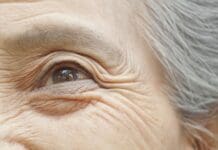We all know intuitively that sleep is important.
Along with diet and exercise, it’s one of the pillars of physical and mental health and well-being.
But new research has shown us that sleep may be even more important than most people realize.
As it turns out, cutting corners on your sleep schedule (sleeping less than your full 8 hours per night) may hurt you a lot more in the long-term than anyone could have predicted.
Let’s take a look at the science, including information from this new study that just hit the mainstream news waves.
Sleep Deprivation Increases Dementia Risk
According to a paper that was published in April 20th, 2021, (titled Association of sleep duration in middle and old age with incidence of dementia) an association was found between sleep duration and incidence of dementia.
In 521 diagnosed cases, in subjects ages 50-60, there was a reported higher dementia risk associated with sleeping 6 hours per night or less.
Here’s exactly what the study abstract said.
“Here we report higher dementia risk associated with a sleep duration of six hours or less at age 50 and 60, compared with a normal (7 h) sleep duration, although this was imprecisely estimated for sleep duration at age 70.”
The abstract went on to say this.
“Persistent short sleep duration at age 50, 60, and 70 compared to persistent normal sleep duration was also associated with a 30% increased dementia risk independently of sociodemographic, behavioural, cardiometabolic, and mental health factors. These findings suggest that short sleep duration in midlife is associated with an increased risk of late-onset dementia.”
Sleep Is An Important And Essential Ingredient to Human Health and Wellbeing
Poor sleep is linked to a number of health concerns in humans.
Some of these include:
- Higher body weight
- Poorer eating habits
- A lesser ability to concentrate and remain productive
- Poorer athletic performance
- A greater risk of stroke and heart disease
- An increased risk for type 2 diabetes
- Depression
- Poorer immune function
- Increased inflammation
Sleep gives both the body and the mind the opportunity to recharge. It helps you to transition from being in a tired, exhausted state, to feeling refreshed, awake, alert, and productive.
Without adequate sleep, neither the brain nor the body can function.
Sleep helps you to process memories, concentrate, and fight off diseases.
It also helps you to set yourself up for success.
Fight Sleeping Problems With These 3 Simple Tips
A lot of people suffer from sleep-related problems.
But believe it or not, a few changes to your daily routine can really make a big difference, and help you to get a bit more of that crucial ‘shuteye’ you’ve been missing out on.
1. No Caffeine After Lunch
Did you know that it can take up to 10 hours for caffeine to completely clear out of your bloodstream?
In other words; if you drink a coffee for lunch at noon, and then try to go to bed at 9 pm, some of that caffeine will still be in your body, and may keep you awake.
Best practice for caffeinated drinks? Consume one in the morning, and resist the urge to reach for another.
2. Avoid Screens Two Hours Before Bed
Unfortunately, cell phone and tablet screens emit blue light, which keeps your body from producing melatonin (the hormone that helps regulate your circadian rhythm).
For best results, consider shutting off all of your screens two hours before bed.
Try reading a book or meditating instead of screen-browsing.
It just may contribute to a better night’s sleep.
3. Give Yourself 45 Minutes To Fall Asleep
Most people fall asleep within 10 to 20 minutes.
But I’ve found that if you plan for more than that, you can get a positive jump on your rest.
If you go to bed 45 minutes before you need to be asleep, you’ll feel that much better in the morning, because you’ll be getting the amount of sleep that you actually need.
This is especially true if you tend to toss and turn a bit before actually succumbing to unconsciousness.












